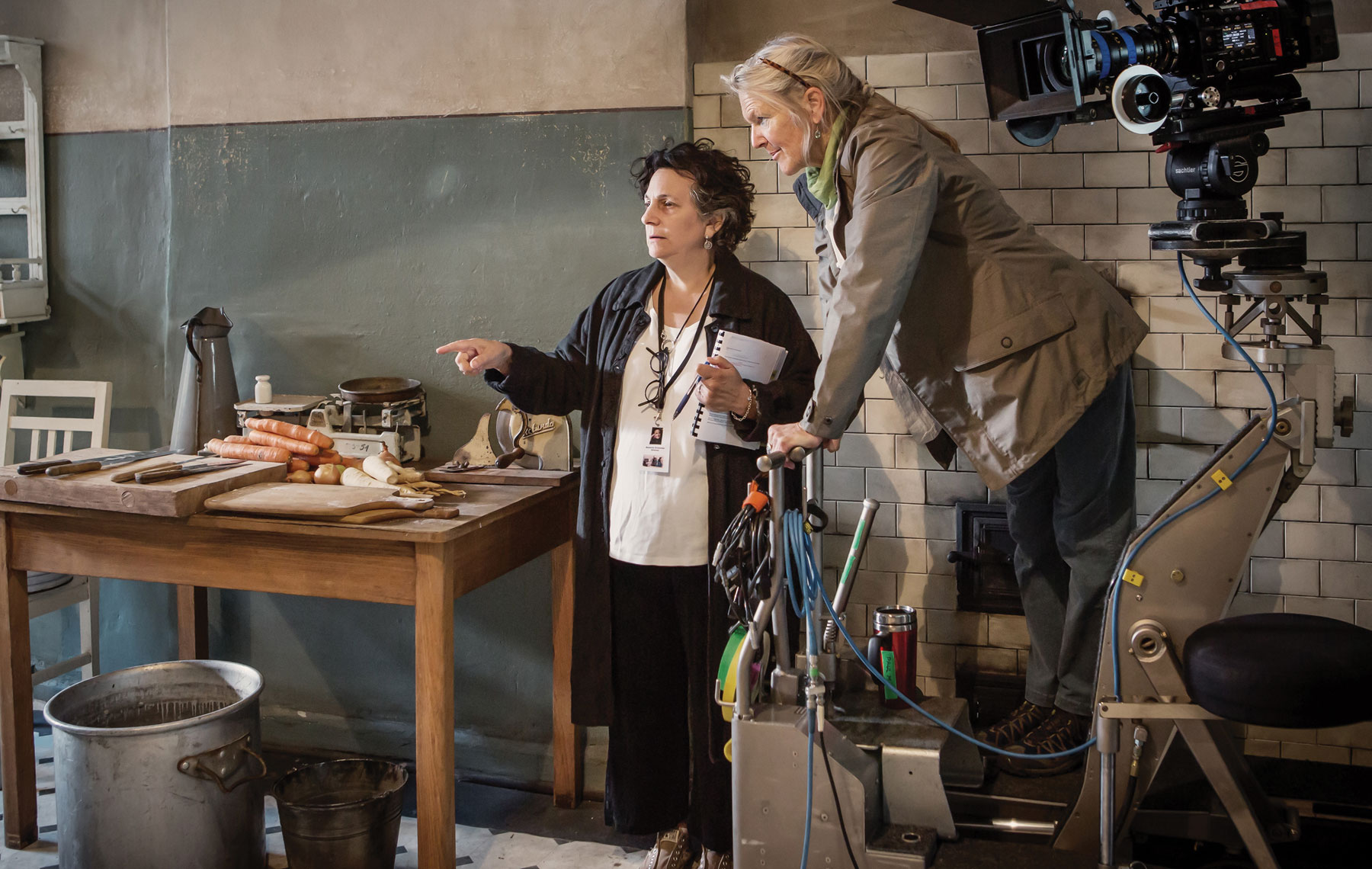 Director Roberta Grossman (left) and director of photography Dyanna Taylor on the set in Poland.
Photo by Anna Wloch
Director Roberta Grossman (left) and director of photography Dyanna Taylor on the set in Poland.
Photo by Anna Wloch After the Holocaust, tales of Jewish acts of rebellion against the Nazis came to light, including partisan fighters battling in the forests, and uprisings in concentration camps and ghettos. Another story of heroic defiance is less well known but has lasting significance.
In the Warsaw Ghetto, a clandestine group called the Oyneg Shabes documented daily life over a three-year period, collecting evidence of Nazi atrocities, amassing more than 30,000 pages of essays, poems, letters, newspapers, photographs and official documents. Few members of the secret group survived, but the material they buried in 1943 was unearthed in 1946 and 1950. Today, the archive — an invaluable historical record — is housed at the Jewish Historical Institute in Warsaw.
The story of this secret archive and the individuals who risked their lives to speak the truth is the subject of the documentary “Who Will Write Our History,” written, produced and directed by Roberta Grossman and based on Samuel D. Kassow’s 2007 book of the same name. Executive produced by Nancy Spielberg, the film combines archival footage, interviews, dramatizations shot in Poland in Polish and Yiddish, and the writings of Oyneg Shabes members Emanuel Ringelblum and Rachel Auerbach, read by actors Adrien Brody and Joan Allen.
“I’ve been obsessively reading about the Holocaust since I was a kid,” Grossman told the Journal. “It seemed a great travesty to me that the story wasn’t known.”
“I don’t know how you could come of age in the period after the Holocaust and not be consumed by it.” — Roberta Grossman
She delved into research, “reading as much as I could, reading endless books, primary and secondary sources. Most of Rachel Auerbach’s work had never been translated. There were boxes of her material at Yad Vashem (the Holocaust memorial museum in Jerusalem) that had never been digitized,” she said. “I had someone here in Los Angeles translate it.”
Grossman also worked closely with the Jewish Historical Institute, where the contents of 10 boxes and two milk cans of archived artifacts are preserved (a third cache is still missing, believed to be buried under the Chinese embassy in Warsaw).
The collection is available only to scholars and researchers, but a selection of documents, photos and a milk can are displayed on the museum’s main floor.
After putting “History” aside to make “Hava Nagila” (2012) and “Above and Beyond” (2014), Grossman completed filming in July 2018. “I think the biggest challenge was deciding what to leave out, because the archive is so full of amazing writing and incredible stories,” she said. “I had to tell the story of the archive, the ghetto, the war and the individual characters I brought forth and show as much as possible what it was like to live in the ghetto and honor people living under the most extreme circumstances who were willing to die for the truth.”
In the absence of footage and all but a few photos of the Oyneg Shabes members, Grossman chose to dramatize their stories with actors. “As a filmmaker, I feel I get to use whatever tools are available to convey the story in the most powerful way possible,” she said.
An L.A. native, Grossman grew up in a family that was “not religious by any means, but we celebrated the major holidays. Being Jewish was the central part of our identity,” she said. Today, Temple Israel in Hollywood, where her three children attended the day school and became b’nai mitzvah, “is our village and a very important part of our lives.”
Many of her films have a Jewish connection, including “Blessed Is the Match: The Life and Death of Hannah Senesh,” about another hero of the Holocaust. “I don’t know how you could come of age in the period after the Holocaust and not be consumed by it,” she said. “For me, it was an obvious thing to be preoccupied with it. It can be extremely painful. But it’s an important thing to grapple with and try to come to terms with.”
After premiering in July at the San Francisco Jewish Film Festival, where it won the audience award for best documentary, “Who Will Write Our History” played festivals around the world. “The response to the film has been really remarkable,” Grossman said. “I feel like I should devote as much time and resources and energy to getting the film out to the world as making it. There’s no point in making it if it doesn’t get seen.”
On Jan. 27, on International Holocaust Remembrance Day, 300 screenings will take place at more than 200 venues in 40 countries, including UNESCO headquarters in Paris, with a post-screening discussion that will be streamed live via Facebook.
“I have a firm belief that film is the most profound or lasting way to teach the Jewish story and history in general,” Grossman said. “I’m proud that I’ve made films that convey different aspects of the Jewish story in a way that I think is educational, entertaining and emotional.”
“Who Will Write Our History” opens at the Laemmle Music Hall and Town Center 5 on Feb. 1. Q-and-A sessions with Roberta Grossman and Nancy Spielberg will follow select screenings.






















 More news and opinions than at a Shabbat dinner, right in your inbox.
More news and opinions than at a Shabbat dinner, right in your inbox.